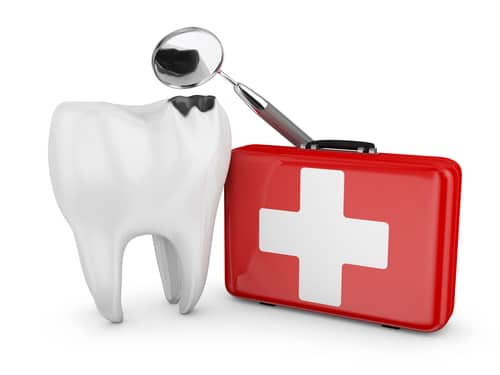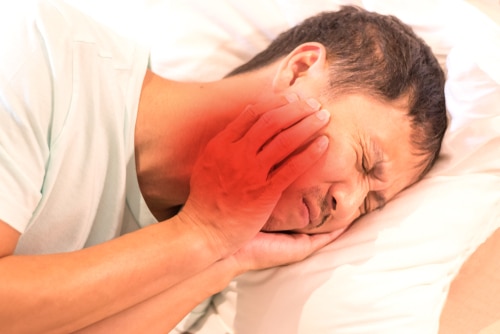Emergency Dentistry in Union City, NJ
Dental emergencies can be scary. You may be in pain and feel like something is wrong, but you aren’t sure what to do or even whether to go to an emergency room or a dentist. Should you ever be in a situation like this, Diana Rodriguez, DMD, offers the emergency dentistry services you need.
On average, someone visits a hospital emergency department for dental conditions once every 15 seconds. But while sometimes the emergency room is a necessity depending on the nature of your situation, there are many times when seeing a dental professional is the better option.
Dental professionals are often better trained in emergency dentistry and can provide smile-saving care when you need it.
Provided your emergency is not something better suited for a medical doctor, we can provide you with expedient care when you’re experiencing significant tooth pain, or you’ve sustained a traumatic injury to your teeth, gums, or jaw, helping to protect your oral and overall health and prevent further catastrophe.
When Should I Seek Emergency Dental Services?
 There are times when you’ll know without a doubt that you need emergency dentistry. Other times, you may delay treatment because you feel the issue is not as painful or alarming as you’d expect in an emergency.
There are times when you’ll know without a doubt that you need emergency dentistry. Other times, you may delay treatment because you feel the issue is not as painful or alarming as you’d expect in an emergency.
Remember that it is okay to reach out with questions. You can either be assured that your situation can wait for an office visit the next day, or you’ll receive definite instruction that you need emergency care. Either way, you gain more peace of mind.
Make sure to reach out to Diana Rodriguez, DMD, right away if you:
- Have a loose tooth
- Have had a tooth knocked out
- Have sustained tooth damage
- Have a severe toothache
- Have a swollen jaw
- Have a dental abscess
- Are persistently bleeding from the mouth
- Are seriously concerned about your oral health
Sometimes, the issue is beyond the scope of emergency dentistry and is simply a flat-out emergency. If you suspect your jaw is broken, you are in severe pain, there are injuries outside of your mouth, or you’re generally concerned for your safety, get yourself to a hospital as soon as possible.
What Is a Traumatic Dental Injury?
The name sounds alarming, and in certain instances, it should be, but traumatic dental injuries don’t always need to be gruesome or involve a high-impact accident. They’re simply any kind of injury involving damage to the teeth, gums, or jaw.
These injuries can range from breaking a tooth by biting something hard to cutting the inside of your mouth following a collision in contact sports to a tooth being knocked completely out in a car accident.
The Different Types of Traumatic Dental Injuries
Various dental injuries may require emergency dentistry services. Below are some of the most common, along with some basic tips on what to do should you sustain that specific injury.
Broken Tooth
A high-impact accident can cause you to break or chip your tooth, but so can something seemingly benign, like chewing on a pen cap or ice cubes.
This type of dental injury is generally simple enough to treat with bonding, crowns, inlays, or onlays, but it requires immediate attention, as broken teeth are far more susceptible to decay and infection. Attempt to find the broken piece of tooth, and then contact us.
Dislodged or Loose Tooth
If you’re involved in an accident in which your tooth is knocked loose from its socket but still remains in your mouth, that’s considered to be a luxation. With the help of emergency dentistry, this type of injury can be treated fairly easily.
However, in certain instances, permanent damage to the tooth root, nerves, or blood vessels can occur, and root canal therapy may be required to preserve the tooth.
Should you experience a dislodged tooth, emergency dentistry is necessary. Contact us as soon as possible, as the tooth may not have the necessary support to remain in your mouth. If it falls out, make sure to only handle it by the crown, or it may not be able to be placed back into your mouth.
Extrusion or Intrusion
 When the tooth is knocked further up into its socket, that’s considered an intrusion. When it’s knocked slightly out of it but still maintains a bit of support from the surrounding tissue, that’s called an extrusion.
When the tooth is knocked further up into its socket, that’s considered an intrusion. When it’s knocked slightly out of it but still maintains a bit of support from the surrounding tissue, that’s called an extrusion.
In both cases, it’s critical to seek emergency dentistry services as soon as you can, or you may wind up losing the tooth altogether.
Knocked Out Tooth
Perhaps the most dramatic of all dental injuries is an avulsion, otherwise known as a knocked-out tooth. It’s easy to panic in a moment like this, but it’s important to try to remain calm and act fast.
Find the knocked-out tooth and handle it only by the crown, not by the root. Rinse it off carefully with water only, and then try to place it back in the socket. If that doesn’t work, you can hold it in your cheek while you seek emergency dentistry services.
The reason to do this is that sometimes, if you can manage to preserve the tooth, it’s possible for it to be placed back into its socket and allowed to heal. Your odds to do this reduce drastically as time goes by, so you need to move as quickly as possible after the tooth is knocked out.
Damage to the Soft Tissue
It’s not all about the teeth when it comes to emergency dentistry. Your tongue, lips, and gums are very sensitive and can sustain some serious damage in an accident.
However, it’s not always the case that a soft tissue injury requires emergency attention. Use your discretion, but if the bleeding is significant or persistent, you should contact us.
Typical Causes of Traumatic Dental Injuries
If you’re looking to avoid the need for emergency dentistry, there are a few different situations you should remain aware of at all times. Of course, by nature, accidents are not totally preventable, but identifying dangerous situations and exercising the proper precautions around them can go a long way.
Sports Injuries
The number one way that dental injuries occur is during contact sports. Moving at high speeds with elbows and knees flying around can be a recipe for disaster in dental health, but you can prevent many injuries by simply wearing a mouthguard whenever you’re on the field.
Car Accidents
Incidents while behind the wheel of a car are another very common cause of dental injuries. Fortunately, statistics show that the numbers are dropping in this category, but that doesn’t mean you should forget just how much danger you’re actually in whenever you’re in a moving vehicle.
Driving with caution and always wearing your seat belt are both critical, but neither is a surefire way to avoid an accident.
Falling
A few different things need to go wrong in order for you to sustain a dental injury due to slipping and falling, but while it’s not incredibly common, it certainly happens enough to merit some caution. Being aware of your surroundings and keeping whatever spaces you have control over clear of obstructions is key to avoiding this type of injury.
Biting Hard Objects
It’s not an uncommon habit to chew on things like ice cubes and pen caps, but it’s certainly a bad one. It may seem harmless, but you may find yourself seeking emergency dentistry services someday soon if you continue to do it.
Compassionate Emergency Dentistry with Diana Rodriguez, DMD
If you find yourself in a painful or scary emergency dental situation, don’t hesitate to contact Diana Rodriguez, DMD. With state-of-the-art facilities and free consultations, you will receive the care you need.
